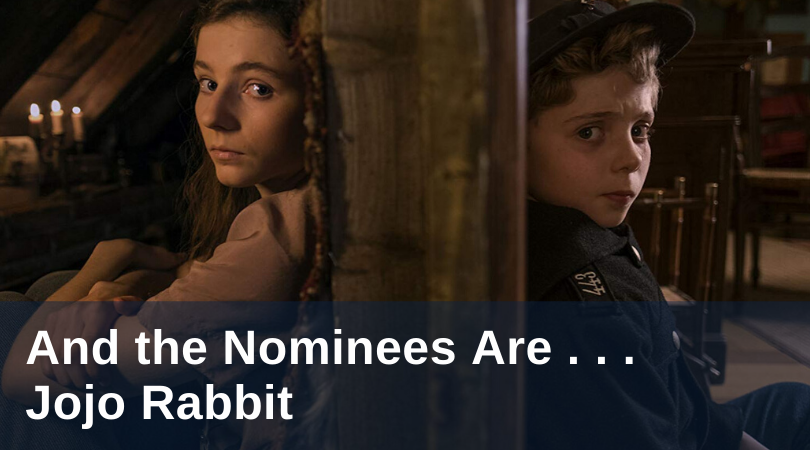
Best Picture nominee Jojo Rabbit, directed by New Zealand’s Taika Waititi, is bookended by two anachronisms: German-language versions of The Beatles’ “I Want to Hold Your Hand” and David Bowie’s “Heroes.” These breaks in the historical tone help remove the viewer from the momentous cultural and political events of World War II. Waititi instead invites us into the life and mind of our protagonist: ten-year-old Johannes “Jojo” Betzler (played by Roman Griffin Davis), who is riding out the end of the war with his mother, Rosie (Scarlett Johansson), and his imaginary friend and idol, Adolph Hitler (Taika Waititi).
Early in the film, Jojo earns the nickname “Jojo Rabbit” at his Hitler Youth camp when he defies his commanders and refuses to kill a helpless rabbit. Lamenting his social rejection and trying to make sense of competing understandings of bravery—to unhesitatingly hurt others or to protect the defenseless?—Jojo talks through things with his imaginary friend. “The rabbit is no coward. The humble little bunny faces a dangerous world every day hunting carrots for his family, for his country,” Waititi’s Hitler explains. There are other ways to be brave than the violent homogeneous model provided by the older Hitler Youth members. In what is undoubtedly the only good advice ever given by Adolph Hitler, whether fictional or factual, he continues: “Be the rabbit. The humble bunny can outwit all its enemies. He’s brave and sneaky and strong. Be. The. Rabbit.”
In a desperate bid to reclaim his status in both the adolescent and Hitler Youth hierarchies, Jojo injures himself with a misthrown grenade, failing to demonstrate the bunny’s cleverness or skill. Jojo is left scarred and temporarily debilitated, forcing a new perspective on him. While confined to his home and to menial tasks for the Hitler Youth, Jojo notices how hard his mother Rosie works. He realizes, however, that her efforts are not in line with Jojo’s or Germany’s. Rosie is working with the resistance movement. And Jojo soon uncovers her riskiest endeavor: hiding a Jewish teenage girl, Elsa (played by Thomasin McKenzie) in the walls of Jojo’s childhood home. First hoping to turn in Elsa, then taunting her with threats and imaginative drawings of harm he will do to her boyfriend, Jojo eventually comes to befriend her.
Jojo comes to see the power that can be found in weakness. When he makes Elsa cry, Jojo recognizes her humanity but also that he, a small boy deemed useless by the Nazi war machine, is still capable of harming others. Jojo comes to recognize the humanity of others in his life when he sees them outside of neat categories as well. His mother in many ways fails Jojo, yet we mourn her with him. His former Hitler Youth leader (played by Sam Rockwell) is an indifferent Nazi who uses what power he has to protect Jojo and Rosie as best he can. And the Gestapo officer whom Jojo should adore, since he praises Jojo’s childish illustrations of harming Jews and most embodies the Nazi leadership’s values, is a terrifying figure for all of his absurdity and banality. Traditional figures of authority become frightening as Jojo comes to recognize the hideous truth: they are the bad guys.
Jojo Rabbit is a historically-set morality tale about the real-life battle of choosing good or choosing harm, choosing love or hate, choosing convenient lies or harsh truths, and of the ongoing work of conversion. JoJo is not perfect in his conversion. He is still a scared child, trying to survive and keep who and what he loves close. Having lost everything and everyone, he lies to try to keep Elsa tied to him at the end of the war. At this point, when they have nothing but each other, JoJo and Elsa are truly free. They are two clever, quick rabbits who have survived and can now run free from fear.
The lesson of the tale? The small triumphs of the rabbits—whether a refusal to kill the innocent, the protection of the defenseless, or even just the willingness to “look a tiger in the eye”—are the things that make a difference in the world. The small heroics of humble people compound like so many small, fast, clever rabbits. They will always outnumber the tigers. Imagine what you could do as a rabbit: stand up for the powerless, look the tigers in the eye, be brave and sneaky and strong. Be the rabbit.
Featured image: imdb.com; fair use


